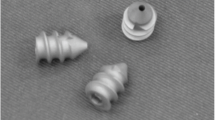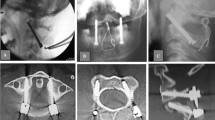Abstract
Prospective study of 27 consecutive cases of tuberculous atlanto-axial instability operated between 1998 and 2003. Early surgical stabilization of tuberculous atlanto-axial instability has gained popularity. This is largely due to success of chemotherapy in rapid control of infection. Although selective atlanto–axial fusion techniques are advocated in other indications, their role in tuberculosis remains confined to atlanto-axial wiring techniques that are mechanically unsound. The role of three-point rigid fixation using trans-articular screws (TAS) remains unclear. The objectives of this study are: (1) To define the role of trans-articular screws in tuberculous atlanto-axial instability based on radiological criteria. (2) To attempt to separate patients that can be treated by selective atlanto-axial fixation as against the standard occipito–cervical fusion (OCF). (3) Compare the clinical and radiological outcome parameters between the two groups. Twenty-seven consecutive patients of tuberculous atlanto-axial instability were operated between 1998 and 2003. The pattern of articular surface destruction and the reducibility of the atlanto-axial complex were assessed on plain radiographs and MRI. The reducibility of the C1–C2 joint was graded as reducible, partially reducible and irreducible. Pattern of the C1–C2 articular mass destruction was grouped as minimal, moderate and severe. The patients were divided into two surgical groups based on radiological findings and were treated with TAS (n=11) and OCF (n=16) fusion. The three-point fixation provided by the TAS allowed early brace free mobilization by 3 months with fusion rate of 100%. Fusion occurred in 83.16% in the OCF group. Implant failure occurred in two patients who underwent OCF. The patient satisfaction rate in the TAS group and the OCF group was 90.90 and 62.50%, respectively. Results in 27 consecutive patients demonstrate improved patient fusion and satisfaction rates in the TAS group. Judicious selection of patients for TAS fixation is possible with relatively few complications in tuberculosis of the atlanto-axial complex. This, however, requires a thorough understanding of the MRI pattern of involvement of the atlanto-axial complex that is difficult in non-endemic areas.






Similar content being viewed by others
References
Arunkumar MJ, Rajshekhar V (2002) Outcome in neurologically impaired patients with craniovertebral junction TB: results of combined AP surgery. J Neurosurg 97(2 Suppl):166–171
Behari S, Nayak SR, Bhargava V, Banerji D, Chabra DK, Jain VK (2003) Craniovertebral tuberculosis: protocol of surgical management. Neurosurg 52(1):72–80
Bhojraj SY, Shetty N, Shah PJ (2001) Tuberculosis of the craniovertebral junction. J Bone Joint Surg Br 83(2):222–225
Chen TY, Lin KL, Ho HH (2004) Morphologic characteristics of atlantoaxial complex in rheumatoid arthritis and surgical consideration in Chinese. Spine 29(9):1000–1004
Cosey AT, Crockhard HA, Geddes JF, Stevens J (1997) Vertical translocation: the enigma of the disappearing atlatnodens interval in patients with myelopathy and RA: Part 1 Clinical, radiological and neuropathological features. J Neurosurg 87(6):856–62, 863–69
Dickman CA, Sontag VK (1998) Posterior transarticular screw fixation for atlantoaxial instability. Neurosurg 43(2):275–280
Edwards RJ, David KM, Crockard HA (2000) Management of tuberculomas of craniovertebral junction. Br J Neurosurg 14 (1):19–22
Fang D, Leong JC, Fang HS (1983) Tuberculosis of the upper cervical spine. J Bone Joint Surg Br 65(1):47–50
Farey ID, Nadlarni S, Smith N (1999) Modified Gallie’ technique versus TAS fixation in C1–C2 fusion. Clin Orthop Relat Res 359:126–35
Gluf WN, Schmidt MH, Apfelbaum R (2005) Atlantoaxial TAS fixation: a review of surgical indications, fusion rate, complications and lessons learnt in 191 adult patients. J Neurosurg Spine 2(2):155–163
Goel A, Desai K, Muzumdar DP (2002) Atlantoaxial fixation using plate and screw method. A report of 160 treated patients. Neurosurgery 51(6):1351–1356
Goel VK, Clark CR, Gallaes K, Liu YK (1988) Moment rotation relationships of the ligamentous occipito–atlanto–axial complex. J Biomech 21(8):673–680
Ha KY, Chung YG, Ryoo SJ (2005) Adherence and biofilm formation of Staphylococcus epidermidis and Mycobacterium tuberculosis on various spinal implants. Spine 30(1):38–43
Haid RW Jr, Subach BR, Mc Laughlin MR (2001) C1–C2 transarticular screw fixation for atlantoaxial instability: a 6 year experience. Neurosurgery 49(1):65–68
Krishnan A, Patkar D, Patankar T, Shah J, Prasad S, Bunting T, Castill M Mukherji SK (2001) Craniovertebral junction tuberculosis, a review of 29 case. J Comput Assist Tomogr 25(2):171–176
Lal AP, Rajshekhar V, Chandy MJ (1992) Management strategies in tuberculous atlantoaxial dislocation. Br J Neurosurg 6(6):529–535
Lifeso R (1987) Atlantoaxial tuberculosis in adults. J Bone Joint Surg Br Mar 69(2):183–187
Madawi AA, Casey AT, Solanki GA, Tuite G, Veres R, Crockherd HA (1997) Radiological and evaluation of the atlantoaxial TAS fixation technique. J Neurosurg 86(6):961–968
Marcotte P, Dickman CA, Sonntag VK (1993) Posterior atlantoaxial facet screw fixation. J Neurosurg 79(2):234–237
Melcher RP, Puttlitz CM, Kleinstueck FS, Lotz JC, Harms J, Bradford DS (2002) Biomechanical testing of posterior atlantoaxial fixation techniques. Spine 27(22):2435–2440
Menezes AH, Van Gilder JC, Clark CR, el-khoury G (1985) Odontoid upward migration in RA: an analysis of 45 patients with “cranial settling”. J Neurosurg 63(4):500–509
Mitchell TC, Sadasivan KK, Ogden AL (1999) Biomechanical study of atlantoaxial arthrodesis: transarticular screw fixation versus modified Brook’s posterior wiring. J Orthop Trauma 13(7):483–489
Moon MS, Choi WT, Moon YW, Moon JL, Kim SS (2002) Brook’s posterior stabilization surgery for atlantoaxial instability: review of 54 cases. J Orthop Surg (Hong Kong) 10(2):160–164
Neville CH Jr, Davis WL (1971) Is surgical fusion still desirable in spinal tuberculosis. Clin Orthop 75:179–187
Pandya SK (1971) Tuberculous atlantoaxial dislocation (with remarks on the mechanism of dislocation). Neurol India 19(3):116–121
Panigrahi MK (2003) Craniocervical tuberculosis: protocol of surgical management. Neurosurgery 53(4):1009–1010
Shukla D, Mangia S, Devi Bl, Chandramouli BA, Das BS (2005) Management of craniovertebral junction TB. Surg Neurol 63(2):101–106
Sinha S, Singh AK, Gupta V, Singh D, Takayasu M, Yoshida J (2003) Surgical management and outcome of tuberculous atlantoaxial dislocation: a 15 year experience. Neurosurgery 52(2):331–338
Song GS, Theodor N, Dickman CA, Santong VK (1997) Unilateral posterior atlantoaxial transarticular screw fixation. J Neurosurg 87(6):851–855
Sunahara N, Matsunaga S, Movi T, Igivi K, Sakoo T (1997) Clinical course of conservatively managed RA patients with myelopathy. Spine 22(22):2603–2607
Valaskatzis E, Govender S (2005) Tuberculosis of the craniovertebral junction: two case reports. Eur Spine J 5(2):140–142
Author information
Authors and Affiliations
Corresponding author
Rights and permissions
About this article
Cite this article
Bapat, M.R., Lahiri, V.J., Harshavardhan, N.S. et al. Role of transarticular screw fixation in tuberculous atlanto-axial instability. Eur Spine J 16, 187–197 (2007). https://doi.org/10.1007/s00586-006-0071-6
Received:
Revised:
Accepted:
Published:
Issue Date:
DOI: https://doi.org/10.1007/s00586-006-0071-6




